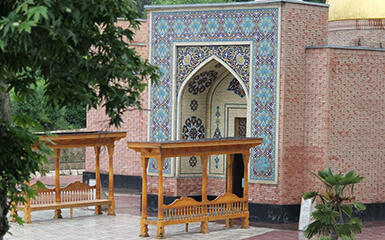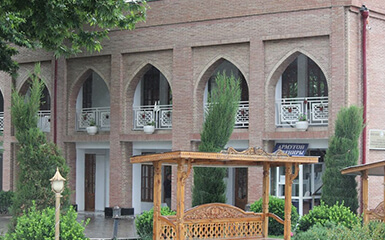Kok Gumbaz
Ajina Teppa
Ancient Panjakent
Anzob Tunnel
Beshkent Qala
Childukhtaron
Khazrati Shokh
Mug Teppa
Gharm Chashma
Hisor Historical
Haji Yaqub mosque
Hazrati-Bobo complex
Lake Iskanderkul
Kalai-Khumb
Karatag
Karon
Khishtin caravanserai
Khorog
Khulbuk
Lake Karakul
Abdullatif Sultan
Madrasai Kuhna
Abu Abdullah Rudaki
Khoja Mashhad
Khudoyor Valami
Makhmudi Azam
Mir Sayyid Ali Hamadani
Muhammed Bashoro
Sheikh Muslihiddin
Nurek Mountain Lake
Pamir
Sarazm
Sari-Khosor
Seven Lakes
Shirkent
Chiluchorchashma
Takht-i Sangin
Mausoleum of Mir Sayyid Ali Hamadani

Mir Sayyid Ali Hamadani's Mausoleum is an amazing place to visit if you are in Kulob. It was renovated to its original splendour nearly 50 years ago and is great to see. There is a donation box inside the mausoleum, as in most visiting shrines in Central Asia. These donations are distributed to poor people as alms or used for the needs of the shrine. Take off your shoes when entering and keep the noise to a minimum because other people will be praying in some places and it is really a very quiet and peaceful place.
The mausoleum is the burial place of Mir Sayyid Ali Hamadani, a famous Iranian Sufi scholar. The mausoleum has been renovated by the Iranian government and as a result looks like a brand new building. The place is easy to access as it is right in the centre of Kulob city.
Right next to the mausoleum is a museum dedicated to Hamadani, with a small admission price. Non-Muslims are very welcome inside the shrine.
Mir Sayyid Ali Hamadani was an Iranian scholar, poet, and a Sufi Muslim saint of the Kubrawiya sect. He was born in Hamadan, Iran, and preached Islam in Central and South Asia while traveling to practice Sufism. Hamadani was also honoured during his lifetime as Shah-e-Hemadan (King of Hamadan), Amir-i Kabir (Great Commander), and Ali Sani (Second Ali).
Hamadani came from a noble family and enjoyed a Sufi upbringing during his youth. Later he traveled a lot, from Persia, Khorasan, Afghanistan, Iraq to Sri Lanka. In 1379, he reached Kashmir. According to tradition, he arrived there with a following of seven hundred followers. Since this area had only recently been converted to Islam, Hamadani largely contributed to the establishment of Muslim ideas in Kashmir.
A chaneqah is in his honour in Srinagar, the complex was built on the foundation walls of an older Hindu temple. Hamadani died in present-day Afghanistan on his way from Srinagar to Mecca during the Hajj. He was buried by his followers in Kulob, present-day Tajikistan.

